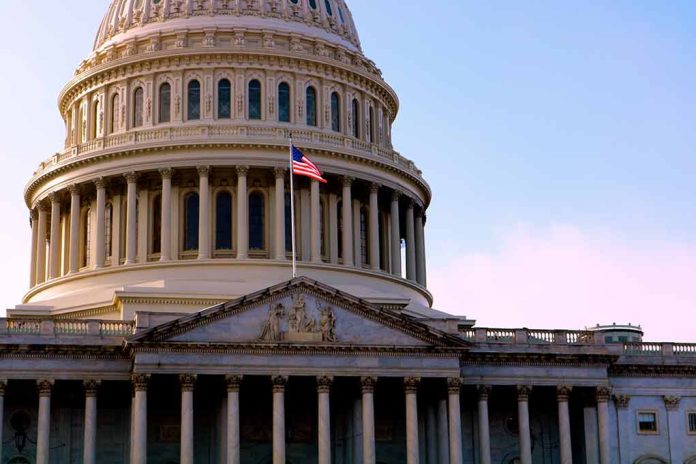
Nine Senate Democrats withdraw support for the GENIUS Act as the cryptocurrency regulation bill heads to a crucial vote, leaving Republicans scrambling for compromise to reach the 60-vote threshold.
Key Takeaways
- Senate Majority Leader John Thune signals openness to Democratic amendments before Thursday’s floor vote on the stablecoin regulation bill.
- Nine Democratic senators have withdrawn support, citing inadequate provisions for anti-money laundering, national security, and financial system safeguards.
- The GENIUS Act would create a federal framework for stablecoins, requiring issuers to maintain 1:1 reserves in high-quality liquid assets.
- Republicans need at least seven Democratic votes to advance the legislation, making compromise essential for the bill’s survival.
- President Trump’s cryptocurrency ventures have complicated discussions, with Democrats raising concerns about conflicts of interest.
Republican Leadership Signals Compromise Potential
Senate Majority Leader John Thune has indicated Republicans are willing to consider Democratic amendments to the stablecoin regulation bill, formally known as the Guiding and Establishing National Innovation for U.S. Stablecoins Act (GENIUS Act). With a key floor vote scheduled for Thursday, Thune acknowledged the need for bipartisan cooperation, stating, “Changes can be made on the floor for sure,” while noting he is “waiting to see what it is Democrats are asking for.”
The Republican leadership faces a significant challenge as they need at least seven Democratic votes to reach the 60-vote threshold required to advance the legislation. The bill would establish a comprehensive federal framework for stablecoins, which are digital currencies pegged to fixed assets like the U.S. dollar and currently represent over $240 billion in market capitalization.
U.S. STABLECOIN BILL FACES DEMOCRATIC REVERSAL
Nine Senate Democrats have pulled support from the bipartisan GENIUS Act, citing national security, AML, and consumer protection concerns.
This surprise move threatens the bill’s progress and may delay stablecoin regulations.… pic.twitter.com/ACNUhIIyuO
— Crypto Town Hall (@Crypto_TownHall) May 4, 2025
Democrats Withdraw Support Over Security Concerns
In a significant blow to the bill’s prospects, nine Democratic senators issued a joint statement withdrawing their support for the current version of the GENIUS Act. These senators, including key Banking Committee members who had initially backed the legislation, now insist that substantial changes are needed before they can support it. Their concerns focus on what they view as insufficient provisions for anti-money laundering, oversight of foreign issuers, national security protections, and accountability mechanisms.
The Democratic opposition includes Senators Ruben Gallego, Mark Warner, Lisa Blunt Rochester, and Andy Kim. Notably, Senators Angela Alsobrooks and Kirsten Gillibrand have not joined the opposition, potentially providing Republicans with a narrow path to reaching the required 60 votes if compromises can be reached.
Industry Support Amid Regulatory Uncertainty
Despite the political hurdles, the cryptocurrency industry has voiced strong support for the legislation. Industry leaders emphasize that a clear regulatory framework would enhance stablecoin adoption and reinforce U.S. dollar dominance in the emerging digital economy. The bill represents a significant step toward addressing the current regulatory gap surrounding stablecoins, which have grown rapidly in importance for daily digital transactions.
Republican Senator Bill Hagerty has urged Democrats not to obstruct progress on the bill, “We cannot allow partisan games to derail the momentum we’ve seen over the past 3 months on this legislation,” noted Hagerty. Meanwhile, Thune has defended the legislative process, pointing out that Republicans have already made multiple revisions to address Democratic concerns, stating, “This is the sixth version of the bill … they’ve modified it each time based on feedback they’ve gotten, largely from Democrats.”
The GENIUS Act would allow non-bank stablecoin issuers to operate with appropriate consumer protections and require them to maintain reserves in high-quality liquid assets. The House has proposed a competing bill, the STABLE Act, which would impose more restrictive reserve requirements. With Thursday’s vote looming, the fate of stablecoin regulation remains uncertain as negotiations continue behind the scenes.
Sources:
Thune Signals GOP Willing to Compromise on Stablecoin Bill as Senate Vote Nears
Stablecoins bill faces hurdle after Democrats withdraw support
Senate eyes vote on stablecoin bill despite Democratic revolt



